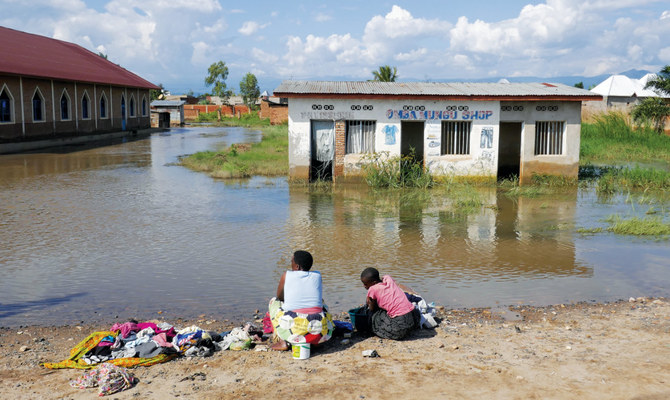
- ARAB NEWS
- 11 Jul 2025

NAIROBI: The historic first Africa Climate Summit held this week allowed the continent to set out how its countries can tackle global warming — with the Arab world taking a key role in shaping the conversation.
Led by Kenyan President William Ruto, the unprecedented gathering underscored the urgent need for global action to combat climate change, placing the Arab angle at the forefront of discussions.
The summit, held from Sept. 4 to 6 in Kenya’s capital Nairobi, set a powerful precedent for cross-continental cooperation, with the goal of harnessing collective strength to mitigate the far-reaching impacts of climate change and secure a sustainable future for both regions.
Climate scientists say that Africa’s susceptibility to climate change is evident, with 17 out of the 20 most affected countries in the world situated on the continent, despite their minimal contribution to global emissions.
Leaders from both Africa and abroad concur that addressing this issue necessitates unified global efforts to assist the continent.
President Ruto’s call for Africa to be recognized as a formidable partner, rather than “a passive victim,” in the battle against global warming has garnered substantial support from regional leaders.
Arab nations are seizing this opportunity to play a pivotal role in supporting the continent’s climate resilience efforts, recognizing that financial assistance is a crucial aspect of unlocking Africa’s green economic potential.
In this context, the Africa Climate Summit can serve as “a catalyst for collaborative initiatives that transcend borders,” Isaac Ndyamuhaki, a Ugandan climate action activist and top finalist of the Africa Climate Innovation Challenge 2023, told Arab News, emphasizing “the potential of these initiatives in finding practical solutions to the climate crisis.”
He added: “Now, African and Arab countries join forces to develop innovative projects aimed at reducing greenhouse gas emissions, conserving natural resources, and bolstering climate resilience.”
In the midst of this dynamic debate, the continent faces the challenge of balancing its economic potential in fossil fuels with the need for developing renewable energy to tackle global warming.
While some African countries, such as Uganda and Kenya, embrace cleaner energy options including electric vehicles and solar energy at the household level, nations like Nigeria and Senegal, with substantial oil and gas reserves, argue that these resources are crucial for economic growth and increased energy access.
Nigeria’s oil-producing sector is expected to endure for several more decades, and Senegal has recently made substantial oil and gas discoveries. Namibia is navigating a middle ground, attracting investments in renewable energy while exploring potential oil fields off its coast.
“For the African continent a just and gradual shift is of utmost importance,” Ndyamuhaki stated, stressing that “governments and communities need time to adapt.”
Against the background of the conference, the spotlight shines on the Africa Carbon Markets Initiative which is striving to expand carbon offsetting activities on the continent, with the aim of producing 300 million carbon credits annually by 2030.

African leaders believe this initiative can unlock billions in revenue for climate financing. In this regard, the UAE’s pledge of $4.5 billion in clean energy investments in Africa stands out, highlighting their support for the continent’s transition to green energy.
Nonetheless, challenges persist as the issue of climate offsets is becoming increasingly contested, raising questions about the effectiveness of green solutions.
Gabon, one of Africa’s most carbon-positive nations, received £119 million for reducing emissions in 2019. However, this West African country recently experienced a coup, highlighting the complexities of implementing carbon schemes. It’s a stark reminder that global climate change policies often require local population support in the so-called Global South.
Acknowledging the criticism from climate organizations and activists about carbon markets, Joe Lohose, a Congolese energy and climate expert, told Arab News that: “Investing in carbon offsets is a positive step but the challenge typically lies in the execution phase.”
He emphasizes the necessity for a comprehensive strategy involving governments, institutions, and individuals, and stresses that genuine progress depends on collaboration and accountability among all stakeholders.
“The proper strategy must encompass investments in renewable energy, the improvement of energy efficiency, the preservation of natural resources, and the cultivation of sustainable practices,” Lohose added.
Now, African and Arab countries join forces to develop innovative projects aimed at reducing greenhouse gas emissions, conserving natural resources, and bolstering climate resilience.
Isaac Ndyamuhaki, Ugandan climate action activist
He went on to say: “The history of international climate agreements, like the Paris Agreement, has shown that fulfilling commitments can be a struggle. But these commitments coming from Africa and their dedication to finding solutions for global climate change mark a promising beginning.”
Importantly, experts emphasize that technology transfer is a vital element in strengthening Africa’s resilience against climate change. The Arab world’s technological advancements hold the key to enhancing Africa’s capacity to combat climate change, from renewable energy solutions to advanced agricultural practices. Wangari Muter, Africa director at the Global Wind Energy Council, underscored the importance of green industrialization, with increased investments in renewables and the development of renewable energy manufacturing capacity.
Africa currently generates only half of the Netherlands’ solar energy production, highlighting the potential for growth in the continent’s renewable energy sector. The affordability of solar technology could address Africa’s energy poverty crisis, estimated to cost $25 billion — as much as establishing a mid-sized energy plant in Europe.
Despite these promising prospects, Africa received a mere 3 percent of global clean energy investment in the previous year, highlighting financial disparities in the clean energy landscape.
African nations also face higher borrowing costs compared to the World Bank, revealing inefficiencies in securing funds for sustainable initiatives. Globally, the renewable energy sector is surging, with 80 percent of new power plants being of the renewable variety this year, with solar energy leading the charge.
“The transition to electric vehicles is also accelerating,” Ndyamuhaki, the climate action activist, explained, with the market share of electric cars rising from one in 25 to an impressive one in five in just two years. This aligns with the broader trend of increasing investments in clean energy, which has surged to $1.7 trillion, nearly doubling its 2015 figures, while fossil fuel investments have stagnated at $1 trillion.
For Ndyamuhaki, “supporting sustainable initiatives and businesses in Africa is not only an investment in our future but also a global commitment to combating climate change.”